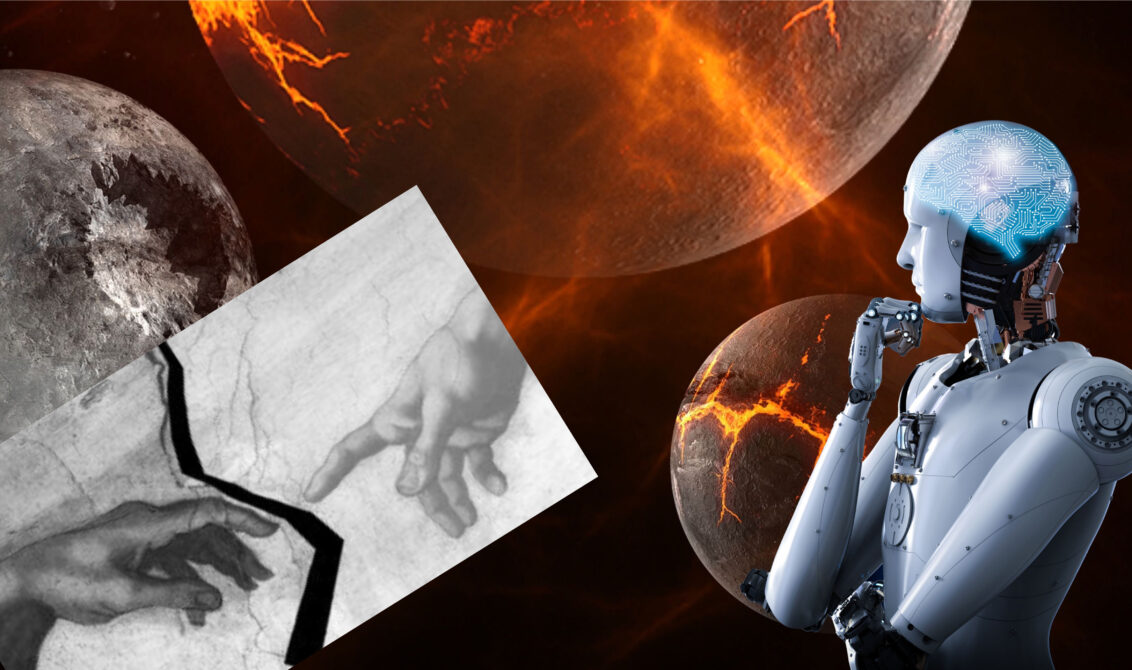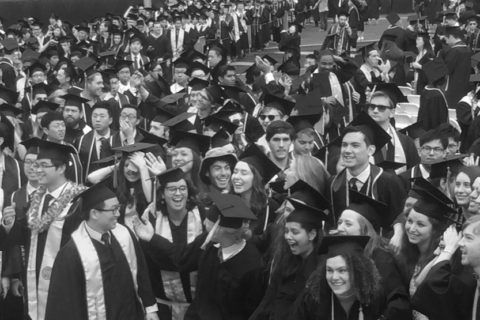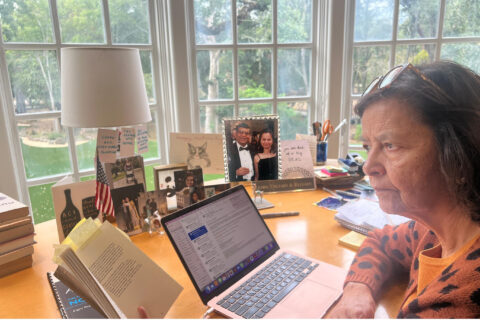
Discussions for and against the existence of God, never progress meaningfully. The arguments quickly turn to objective vs. subjective or science vs. religion. It is easier to advance the dialog and learn from it when we can examine how humans experience God and religion.
I became a non-believer after I turned 50, almost 15 years ago.
God was an integral part of my upbringing in India. But after I gave myself the freedom to move away from God, the first issue I faced was how to conduct myself in my new godless world.
I was raised a Hindu. My parents adopted a guru-ji — ji added for respect — when I was six years old. This tradition of the guru is still prevalent. A guru is a spiritual teacher who helps a person cope with life, through the teachings of God and scriptures. A Guru has many disciples but a disciple adheres to one guru — usually for life. It is like the special relationship between an athlete and his or her coach.
With guru-ji’s involvement, our lives at home changed dramatically. Every morning and evening we would do aarti (worship) of both God and guru-ji around a home altar. Guru-Vandana (prayer) is considered the highest form of worship to attain spirituality. We would sing hymns. We also became vegetarians.
Our guru-ji lived with our family for many years. In most cases, though, gurus live in their ashrams, and disciples visit or may renounce everything to live there. Obviously, my parents were special disciples.
Otherwise, we lived a normal life. My two sisters and I were encouraged to do well in school, participate in extracurricular activities and study science. All three of us became professionals in the mid-1970s, which was quite rare.
Initially, I resented the changed lifestyle at home. My parents found out how I felt from an older cousin, who I confided in. Under parental pressure girls typically conform more than boys. Probably after consulting our guru-ji, my college-educated mother asked me to sit silently with my eyes closed in meditation position, called dhyan (concentration). For an eight-year-old, it felt like punishment.
But gradually I would embrace religion, convinced that praying helped me get better grades and was a good thing.
Then, why did I renounce God?
It started with a realization of the implications of Charles Darwin’s theory of evolution. The human lineage to animals made me conclude, ‘if God was not our creator how could he reward or punish us’.
Then I read scientist Carl Sagan’s Shadow of Forgotten Ancestors. In this 500-page book, Sagan systematically examines the role of God based on research that was convincing and appealing. He concludes, “the more we understand how laws of physics govern the motion of heavenly bodies, the less we need to invoke God.”
In The God Delusion, biologist Richard Dawkins argues how false beliefs about gods are held in the face of strong evidence to the contrary. I found this book less convincing.
In my defiance, I could not stand the irrationality of religion over science within me, and I decided to give up on the idea of God. For a woman raised in a deeply religious home, it was a major step.
The biggest difficulty I faced was the loss of my scaffold. When I was in trouble, or when I wanted to achieve something, I no longer had God to go to. Although at first this was unsettling and increased my anxiety, it was also strangely liberating. I stuck with it. Eventually, I started depending on my inner strength and the power of my own thinking — a good outcome.
My childhood practice of dhyan, or deep concentration, came in handy. Over the years I could invoke this state while walking, sitting, or reclining. Although I had renounced God, the impact of religion learned in childhood was still valuable for mind and body.
Despite the diminishing role of God as the knowledge of science has advanced, there is still room for God. Not understanding the source of dreams, or how to deal with the agony of death or separation, or the power of suggestion, continues to trick our brain into believing in the magic of God. According to a 2016 Gallup poll, almost 80% of Americans still believe in God.
The neuroscientist Andrew Newberg researches the persistence of this culturally rooted belief in God. He is a pioneer in the field of neurotheology — the study of the relationship between the brain and religious experience. He uses brain imaging to show how the brain cannot always tell the difference between actual and perceived reality. Hence spiritual experiences and their effects are real to the brain. As long as that experience is physically and mentally soothing, its mystique sticks.
Such a dialogue can be considered a constructive approach that informs both perspectives by enriching the understanding of both science and religion. It is entirely possible that science and religion meet in the biology of the brain, and both are right even when they seem to contradict each other.








Jayaram Bhat
Congratulations! Great to read your transformation. I became an atheist at 15 – 50 years ago after reading many science books as well as Bertrand Russel. It does take a long time to get rid of the mental baggage from our family and society. But it get better as time goes by. All the best!
Dominique Trempont
Thank you for sharing your journey, Vinita.
Two questions:
– how to you view spirituality vs religion?
– regarding science vs religion, do you about Einstein’s view: “I believe in Baruch Spinoza’s god, who reveals Himself in the lawful harmony of the world, not in a god who concerns himself with the fate and the doings of mankind.”?
vinitagupta
– Religion vs. spirituality:
I view religion as a suggestion or even a prescription for how to lead a purposeful life. While spirituality is an experience of transcendency — worries disappeared. I realize I am not on a sound footing. We should discuss it, over a glass of wine.
– I had not come across this Einstien’s view. So will ponder over it.
Thanks for your comments.
Vijay Gupta
When people ask whether God exists or not, they are usually asking whether a “superhuman intelligent being” exists who i) created the universe, and ii) is omniscient, omnipotent, etc. But the word “God” can have many other (very different) interpretations–such as the one in Vedanta. So before you answer the question: Does God exist? You have to ask: Which version of God?
Also, another important question is: Regardless of whether a particular version of God exists or not, is God a useful concept? For an individual? For a society?
Finally, can you have a religion without God? And could such a religion be just as useful?
Having observed the uses and abuses of both science and religion, I feel that:
i) At the level of an individual, God and religion can provide meaning, purpose, and solace in life when science can’t.
ii) At the level of society, just as science provides a useful counterweight to the excesses of religion, religion provides a useful counterweight to the excesses of science, technology, and pseudoscience.
L.B. Johnson
Once again you raise a thought-provoking topic, Vinita, and one of multiple perspectives which have fascinated me most of my life, and which, I suspect, will continue to evolve for the rest of my life. Mind, body, spirit seem to exist separately and as one. Sometimes for a moment or so they are experienced together with . . . a unity of timelessness and oneness with all living things–something beyond explanation, or expression in words. Thank you for sharing your perspective.
Alok Chandra Gupta
You have put forward your thesis in a very nice way on this rather difficult and complex subject.
Over the years I have developed a belief that God is essential in life. Having said this, I feel God resides in us as inherent goodness. I also believe that, contrary to the popular and all prevalent concept that God is a creator, it is reverse. Man created God, maybe thousands of years ago, to help him in aligning towards the path of basic goodness and self-righteousness. This concept has been used since our childhood by our parents, teachers and elders as a tool to instil in us a sense of morality. When a child does something wrong we tell him that God will punish him and that he will be rewarded by Him if he remains a good boy. The Karmik theory that says one’s action and intentions decide in one’s future is probably nearer to this concept.
vinitagupta
Well, put.
Sarita Prasad
Hello Vinita,
I am in contact with you after nearly fifty years. Both of us have gone through varied experiences in life.
I enjoyed reading your article. According to me there is some power ,to which you can name God ( any God’s name from any so called religions ) , which is the driving force of all the happenings in this physical world. God is in each particle of this Universe. God is inside us also . That is our guiding factor , our conscience. If we see God in every being and in every thing, life becomes so beautiful, tension free. Belief in God does not mean that one should do some rituals , jaap, recitation of some prayers. The one who believes in God , will behave in a virtuous way only . Religion in a broader sense very well merges with science.
vinitagupta
Thank you for your views. Greatly appreciate it.
R K Agarwal
Hi Vineeta, Your thoughts on the issue of existance of God are very clear, as with all other subjects.
To me God is a Concept for getting confidence in difficult situations and to attain more will power to solve the issues at hand at a given point.
There could be endless discussions on existence of God or otherwise, but the outcome may not be substantially different for all educated ones.
R K Agarwal
Your Batchmate
UOR 73′ E
vinitagupta
Thank you
Hemant Lall
Vinita, my childhood upbringing and circumstances were strikingly similar to yours. I have since concluded different religions teach essentially the same thing — do what is good and right. The existence and role of God, though, remains elusive. Hopefully, one of these days I will resolve for myself, like you have, and then have peace. Hemant
Prakash Paranjape
Thanks for the article. Enjoyed reading it. I also read the comments one of which mentions Bertrand Russell. That prompts me to add these lines just to put the issue in perspective. Quite unbeknown to him, Bertrand Russell seems to have ended up working on furthering religious dogma. Also, we know Newton as a scientist, but he spent decades on researching changes to religious texts and was, in the end, quite critical of some of what ended up there eventually. He is reported to have produced six volumes of work based on his findings. It is yet to find published daylight!
Religious dogmas seem to continue to influence our thinking even in current science. The idea of time that we intuitively believe in, for one example, is heavily tinted with the views of one or two religions. There are many more subtleties, but I will end the note here. Thanks.
Prakash Paranjape
Hello,
The use of the capital letter G in the word God is a paradoxical employment. If one really does not believe in the God, the word might as well be spelt ‘god’. Non-political religions are absolutely fine with the small ‘g’ as there is no single god. There can be 10 gods, and there can be 0, too. We often overlook these small details, but IMHO, they are important.
(I just thought I would mention this. Not for publishing per se.)
Keith Martinez
Hi Vinita,
How are you? As you know, I’m Rashmi’s friend. I was born and raised in America, but I deeply appreciate the spiritual contributions India has given me. You have much spiritual heritage to be proud of and I for one am very grateful.
Just curious if you have read some of Vivekananda’s writings. If not, I think it may appeal to your scientific temperament. I’m writing this because, although it is fun to rediscover spiritual truths on our own, you can hasten your progress by learning from the luminaries on this matter. Don’t take my word for it. Here are some tributes by well known personalities/organizations.
On the occasion of America’s Bicentennial Celebration in 1976, the National Portrait Gallery in Washington D.C., mounted a large portrait of Swami Vivekananda and paid tribute to him as one of the personalities who visited America from abroad and made a deep impression on the American mind.
Nikola Tesla, when talking to Vivekananda, was struck by the resemblance between the Samkya theory of matter and energy and that of modern physics. Vivekananda said, “I am working a good deal now upon the cosmology and eschatology of the Vedanta. I clearly see their perfect union with modern science”. Tolstoy constantly talked about Vivekananda to his students. Gandhi, Neru, Rolland, Lord Kelvin and several Harvard professors were deeply impacted by meeting Vivekananda.
Finally, to me, the Real treasure lives within me and it is eternal and complete. Whether I realize it through a scientific, religious or a spiritual path is secondary.
I’ll just mention one more quote by Vivekananda that I love, “The old religion said that he was an atheist who did not believe in God. The new religion says that he is an atheist who does not believe in himself.”
Keith
Aarti Awasthi
Thought provoking as it’s just scraping the surface, as it touches briefly of the new belief in self.. worthy of continued musings.